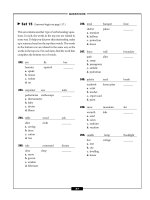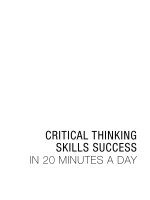Critical Thinking and Reasoning Skills
Bạn đang xem bản rút gọn của tài liệu. Xem và tải ngay bản đầy đủ của tài liệu tại đây (103.04 KB, 12 trang )
N
o matter who you are or what you do, you have to make decisions on a regular basis. You may not
realize it, but even those decisions that seem like second nature—like deciding what to wear when
you’re getting dressed in the morning—require some critical thinking and reasoning skills. When
you decide what to wear, you take many factors into consideration—the weather forecast; the current tempera-
ture; your plans for the day (where are you going? who will you see?); your comfort level (will you be walking a
lot? sitting all day?); and so on. Thus, you are already a critical thinker on some level. But your life is complicated,
and you face decisions that are much more difficult than choosing what to wear. How do you handle a conflict?
Solve a problem? Resolve a crisis? Make a moral or ethical decision?
LESSON
Critical
Thinking and
Reasoning Skills
LESSON SUMMARY
You’ve probably heard the terms “critical thinking” and “reasoning skills”
many times, in many different contexts. But what exactly does it mean
to “think critically”? And just what are “reasoning skills”? This lesson will
answer these questions and show you why critical thinking and rea-
soning skills are so important.
1
15
While there’s no guarantee you’ll always make
the right decision or find the most effective solution to
a problem, there is a way to significantly improve your
odds—and that is by improving your critical thinking
and reasoning skills.
What Are Critical Thinking and
Reasoning Skills?
To improve your critical thinking and reasoning skills,
you need to know exactly what they are.
Critical Thinking
Think for a minute about the words critical thinking.
What does this phrase mean? Essentially, critical think-
ing is a decision-making process. Specifically, critical
thinking means carefully considering a problem, claim,
question, or situation in order to determine the best
solution. That is, when you think critically, you take the
time to consider all sides of an issue, evaluate evidence,
and imagine different scenarios and possible outcomes.
It sounds like a lot of work, but the same basic critical
thinking skills can be applied to all types of situations.
Critical thinking is so important because it helps
you determine:
■
How to best solve a problem
■
Whether to accept or reject a claim
■
How to best answer a question
■
How to best handle a situation
Reasoning Skills
Reasoning skills, on the other hand, deal more with the
process of getting from point A, the problem, to point
B, the solution. You can get there haphazardly, or you
can get there by reason.
A reason is a motive or cause for something—a
justification for thoughts, actions, or opinions. In
other words, it’s why you do, say, or think what you do.
But your reasons for doing things aren’t always
reasonable—as you know if you’ve ever done or said
something in the heat of the moment. Reasoning
skills ask you to use good sense and base your reasons
on facts, evidence, or logical conclusions rather than
just on your emotions. In short, when you decide on
the best way to handle a situation or determine the best
solution to a problem, you should have logical (rather
than purely emotional) reasons for coming to that
conclusion.
Logical: according to reason; according to con-
clusions drawn from evidence or good com-
mon sense
Emotional: drawn from emotions, from intense
mental feelings
“The person who thinks before he acts seldom
has to apologize for his acts.”
—Napoleon Hill
(Think and Grow Rich)
–
CRITICAL THINKING AND REASONING SKILLS
–
16
The Difference between
Reason and Emotion
It would be false to say that anything emotional is not
reasonable. In fact, it’s perfectly valid to take your emo-
tions into consideration when you make decisions.
After all, how you feel is very important. But if there’s
no logic or reason behind your decisions, you’re usually
in for trouble.
Let’s say, for example, that you need to buy a car.
This is a rather big decision, so it’s important that you
make it wisely. You’ll want to be sure that you:
■
Carefully consider your options
■
Consider different possibilities and outcomes
■
Have logical reasons to support your final decision
It may seem obvious that you need to choose a car
that best suits your lifestyle and your budget. For exam-
ple, as much as you might like sports cars, you shouldn’t
buy the new special edition Corvette if you have four
children and a tight budget. But for a variety of emo-
tional reasons, many people do make these kinds of
unwise, unreasonable decisions. They may have
thought critically and still made the wrong choice
because they let their emotions override their sense of
logic and reason.
Practice
1. For practice, imagine this scenario—buying a
new car—and apply critical thinking and reason-
ing skills to it. First, critical thinking: What dif-
ferent things should you take into consideration
when thinking about what kind of car to buy?
List at least five different considerations. One is
already listed for you.
Things to consider:
1. price
2.
3.
4.
5.
Answers
You probably listed several important issues, such as:
■
Size and style of the car: two-door vs. four-door,
roomy vs. sporty
■
Gas mileage
■
Condition: new or used
■
Safety features
■
Amenities: stereo, air conditioning, and so on
■
Overall reliability and quality
■
Manufacturer
■
Comfort level: leg room, type of seats, and so on
■
Warranty
■
Looks: color, shape, design
Justifying Your Decision
One way to help ensure that you’re using your critical
thinking and reasoning skills is to always justify your
decisions and actions. Why did you do what you did?
Why did you make that decision? Why did that seem
like the best solution? Try this with even your most
everyday decisions and actions. You’ll get to know
your current decision-making process, and you’ll be
able to determine where in that process you can
become more effective.
–
CRITICAL THINKING AND REASONING SKILLS
–
17
Practice
2. Imagine that you really do have to buy a car. Using
your critical thinking and reasoning skills, write
down what kind of car (model, new or used, etc.)
you’d buy and why. You can make up the specifics;
what’s important is that you include several differ-
ent reasons that show you’ve thought about your
decision carefully and critically.
Kind of car:
Approximate price:
Reasons for this choice:
Answers
Answers will vary. Here’s a sample answer.
Kind of car: 1994 Toyota Camry
Approximate price: $6,000
Reasons for this choice:
■
Excellent condition for a used car—recently
inspected; new tires
■
Only 3,500 miles on the car
■
Good gas mileage—30 miles per gallon
■
Affordable—just within my budget
■
Good safety features
■
Big trunk, which I need to deliver equipment
and supplies
■
Decent stereo and air conditioning included
■
Red—my favorite color
Why Critical Thinking and
Reasoning Skills Are
Important
You will face (if you don’t already) situations on the
job, at home, and at school that require critical think-
ing and reasoning skills. By improving these skills, you
can improve your success in everything you do.
Specifically, strong critical thinking and reasoning
skills will help you:
■
Compose and support strong, logical arguments
■
Assess the validity of other people’s arguments
■
Make more effective and logical decisions
■
Solve problems more efficiently
Essentially, these four skills make up problem-
solving skills. For example, if someone wants to
change your mind and convince you of something,
you have a “problem”—you have to decide whether or
not to change your beliefs, whether to accept that per-
son’s argument. Similarly, when you have a choice to
make, or a position you’d like to support, you have a
different type of “problem” to solve—what choice to
make, how to support your position. Thus, this book
will use the term problem solving to refer to any one of
these situations. Problem solving will be the focus of
the next lesson.
–
CRITICAL THINKING AND REASONING SKILLS
–
18
Practice
Use your critical thinking and reasoning skills to solve
the following problem.
Jorge has been offered a promotion with United
Casualty, where he has worked for five years. He
has also been offered a similar job by the com-
pany’s main competitor, The Harrison Group.
Harrison is willing to pay Jorge a little more for
a comparable position. What should Jorge do?
3. List the different issues Jorge should consider in
making this difficult decision.
4. Make a decision for Jorge and explain why that’s
a good decision for him. Feel free to make up the
various circumstances in his life—for example,
whether Jorge lives closer to United or to Harri-
son. The more reasons you can give for his deci-
sion, the better.
Answers
3. Some of the issues Jorge needs to consider include:
■
Money
■
Job security
■
Benefits
■
Compatibility with coworkers
■
Job environment
■
Specific job duties
■
Location/commute
■
Hours
■
Room for advancement
■
Stability of company
4. Answers will vary. Here’s a sample answer:
Jorge should stay with United Casualty. It’s a
much shorter commute—half the time it would
take to get to Harrison—so he would save both
time and gas money, as well as reduce wear and
tear on his car. Currently, he has an excellent
relationship with his supervisors at United and
enjoys working with his coworkers. United is a
solid, stable company—it’s been in business for
over 40 years and had a record year last year.
Harrison, on the other hand, is only ten years
old and has recently had a great deal of
employee turnover.
In Short
Critical thinking is the act of carefully considering a
problem, claim, question, or situation in order to deter-
mine the best “solution.” Reasoning skills, which go
hand-in-hand with critical thinking, ask you to base
your decisions on facts, evidence, or logical conclu-
sions. Critical thinking and reasoning skills are imple-
mented simultaneously to help you make smarter
decisions and solve problems effectively. They also help
you make stronger arguments and better evaluate the
arguments of others.
–
CRITICAL THINKING AND REASONING SKILLS
–
19









